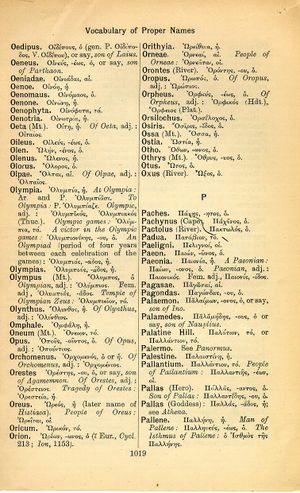Olympia
πωγωνοτροφία φιλόσοφoν οὐ ποιεῖ → a long beard does not make the philosopher
English > Greek (Woodhouse)
Ὀλυμπία,ἡ.
At Olympia: Ar. and P. Ὀλυμπίασι.
To Olympia: P. Ὀλυμπίαζε.
Olympic, adj.: Ὀλυμπικός, Ὀλυμπιακός (Thuc.).
Olympic games: Ὀλύμπια, τά.
A victor in the Olympic games: Ὀλυμπιονίκης, -ου, ὁ.
An Olympiad (period of four years between each celebration of the games): Ὀλυμπιάς, -άδος, ἡ.
Latin > English (Lewis & Short)
Ŏlympĭa: (anciently Ŏlimpus and Ŏlumpus), ae, f., = Ὀλυμπια,
I a sacred region in Elis Pisatis, with an olive wood, where the Olympian games were held; there, too, were the famous temple and statue of Juppiter Olympius: cum Olympiam venisset, maximā illā quinquennali celebritate ludorum, Cic. de Or. 3, 32, 127; id. N. D. 2, 2, 6: cum uno die duo suos filios victores Olympiae vidisset, id. Tusc. 1, 46, 111; 2, 20, 46; Auct. Her. 4, 3, 4; Liv. 26, 24, 14.—Hence,
A Ŏlympĭăcus, a, um, adj., = Ὀλυμπιακος, Olympic: cursus, Auct. Her. 4, 3, 4: palma, Verg. G. 3, 49: corona, Suet. Ner. 25: rami, i. e. oleaster, Stat. Th. 6, 554: palaestra, Luc. 4, 614.—
B Ŏlym-pĭānus, a, um, adj., Olympic (post-class.), Marc. Emp. 35.—
C Ŏlympĭcus, a, um (gen. plur. Olympicūm for Olympicarum, Plaut. Trin. 2, 4, 23), adj., = Ὀλυμπικός>, Olympic (poet. and in post-class. prose): pulvis, Hor. C. 1, 1, 3: certamen, Just. 12, 16, 6; 13, 5, 3.—
D Ŏlympĭus, a, um, adj., = Ὀλυμπιος, Olympic (class.): certamina, the Olympic games, Plaut. Men. 2, 3, 59: ludi, id. Stich. 2, 1, 34: delubrum Olympii Jovis, Mel. 2, 3, 4; Vulg. 2 Macc. 6, 2; Plin. 4, 5, 6, § 14. There was also a temple of Juppiter Olympius in Athens, Suet. Aug. 60; and in Syracuse, Liv. 24, 21: equa, that had run in the Olympic races, Plin. 28, 11, 49, § 181.—
2 Subst.
a Ŏlympĭus, ĭi, m., an appellation bestowed on distinguished men by the Greeks and Romans; of Pericles, Plin. 34, 8, 19, § 74; Val. Max. 5, 10, 1 ext.; on coins, also of the Roman emperors, Hadrian and Commodus, Eckhel. D. N. t. 6, p. 518.—
b Ŏlympĭum, ĭi, n., the temple of the Olympic Jupiter, Liv. 24, 33, 3.—
c Ŏlympia, ōrum, n., Gr. τὰ Ὀλύμπια> (sc. ἱερά>), the Olympic games held every four years at Olympia: sic ut fortis equus, spatio qui saepe supremo Vicit Olympia, in the Olympic games (Gr. Ὀλύμπια νικᾶν>), Enn. ap. Cic. Sen. 5, 14 (Ann. v. 442 Vahl.): ad Olympia proficisci, Cic. Div. 2, 70, 144: magna coronari Olympia (Gr. Ὀλύμπια τὰ μεγάλα; opp. to the games held elsewhere), Hor. Ep. 1, 1, 50: Olympiorum solenne ludicrum, Liv. 28, 7: Olympiorum victoria, the victory in the Olympic games, Cic. Tusc. 2, 17, 41.—
E Ŏlympĭas, ădis, f., = Ὀλυμπιάς>, an Olympiad, the period of four years that elapsed between the Olympic games, and which the Greeks usually employed in the computation of time: centum et octo annis, postquam Lycurgus leges scribere instituit, prima posita est Olympias, Cic. Rep. 2, 10, 18: si Roma condita est secundo anno Olympiadis septumae, id. ib. 2, 10, 18; 2, 15, 28: ante primam Olympiadem condita, id. ib. 2, 23, 42: sextā Olympiade, Vell. 1, 8, 1.—In the poets sometimes for lustrum, i. e. a period of five years: quinquennis Olympias, Ov. P. 4, 6, 5: ter senas vidit Olympiadas, Mart. 7, 40, 6.—
F Ŏlympĭēum, i, n., = Ὀλυμπιεῖον>, a temple of the Olympic Jupiter, Vell. 1, 10, 1.

